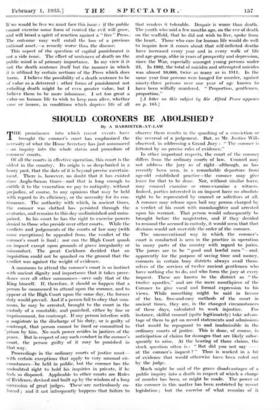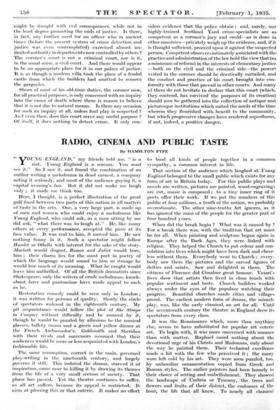SHOULD CORONERS BE ABOLISHED ?
By A BARRISTER-AT-LAW
THE prominence into, recent events have brought the ceroners court has emphasized the necessity of what the Home Secretary has just announced —an inquiry into the whole status and procedure of coroners' courts. . .
Of all the courts in effective operation, this court is the oldest in the. country. Its origin is so deep-buried in a hoary past, that the date of it is beyond precise ascertain- ment. There is, however, no doubt that it has existed since Anglo-Saxon times—and that is long enough to entitle it to the veneration we pay to antiquity, without prejudice, of course, to any opinions that may be held with regard to its efficiency, or the necessity for its con- tinuance. The authority with which, in ancient times, the coroner was clothed has persisted through the centuries, and remains to this day undiminished and unim- paired. In his court he has the right to exercise powers denied to those who preside over other courts. While the verdicts and judgements of the courts of law may (with some exceptions) be appealed from, the verdict of the coroner's court is final ; nor can the High Court quash an inquest except upon grounds of grave irregularity or misconduct. The great Cockburn decided that an inquisition could not be quashed on the ground that the -verdict was against the weight of evidence.
• A -summons to attend the coroner's court is so instinct with .ancient dignity and importance that it takes-prece- dence over all other summonses—save only that of the King himself. If, therefore, it should so happen that a person be summoned to attend upon the coroner, and to appear at the High Court upon the same day, the former duty would prevail. And if a person fail to obey that sum- mons, 'he may be arrested, brought to the court in the custody of a constable, and -punished, either by fine or imprisonment, for contempt. If any person interfere with a magistrate in the discharge of his duty, or is guilty of contempt, that person cannot be fined or committed to • prison by him. No such power resides in-justices of the peace. But-in respect of any such conduct in the coroner's court,- the person guilty of it may be -punished in that way.
Proceedings' in the ordinary -courts of justice must— with certain exceptions that apply to very unusual eir- cninstanees—:be held in public, but the coroner has the undoubted right to hold his inquiries in private, if he feels so disposed. Applicable to other courts are Rules of Evidence, devised and built- up by the wisdom of a long succession of great judges. These '!are meticulously en- forced ; and it not -infrequently happens- that failure, to observe them results in the quashing of a conviction or the reversal of a judgement. Bus, as Mr. Justice Wills observed, in addressing a Grand Jury. : " The coroner is fettered by no precise rules of evidence."
In other important respects, the court of the_ coroner differs from the ordinary courts of law. Counsel may not address the jury as of : right—although, as has recently been seen, in a remarkable departure froni age-old established practice—the coroner may give leave for that to be done. Nor, without similar leave, may counsel examine or cross-examine a witness. Indeed, parties interested in an inquest have no absolute right to be represented by counsel or solicitors at all. A coroner may release upon bail any person charged by a verdict of his court with manslaughter and arrested upon his warrant. That person would subsequently be brought before the magistrates, and if they decided to remand the accused in custody, it would seem that that decision would not over-ride the order of the coroner.
The unconventional way in which the coroner's court is conducted is seen in the practice in operation .in many parts of the country with regard to juries. The jurors are to be " good and lawful men "—and, apparently for the purpose of saving time and money, coroners in certain busy districts always avail them- selves of the services of twelve ancient gentlemen who have nothing else to do, and who form the jury at every inquest. These arc known to the diStriet as " the twelve apostles," and are the mere mouthpiece of the Coroner to give vocal and formal expression to his views. While something might be said in favour of the lax, free-and-easy methods of the court in ancient times, they are, in the changed circumstances of these days, calculated to work injustice. For instance, skilful counsel (quite legitimately) take advan- tage of them to get on record statements and admissions that would be repugnant to and inadmissible in the ordinary courts of justice. This is done, of course, in anticipation of claims for damages that are likely subse- quently to arise. At the hearing of those claims, the stock question often is : " But did you not say -- at the coroner's inquest ? " Thus is worked in a bit of evidence that would otherwise have been ruled out by. the judge.
Much might be said of the grave- disadvantages of a public inquiry into a death in respect of which a charge of murder has been, or might be made. The power of the coroner in this matter- has been restricted by recent legislation ; -but the exercise of what remains of it might be fraught with evil consequences, while not in the least degree promoting the ends of- justice. Is there, in fact, any further need for 'an officer who in ancient times (before the present system of crime detection and justice was even contemplated) exercised almost un- limited authority in departments now controlled by others ? The coroner's court is not a criminal court, nor is it, in the usual sense, a civil court. And there would appear to be no appropriate place for it in our palace of justice. It is as though a modern villa took the place of a feudal castle from which the builders had omitted to remove the gargoyles. • Shorn of most of his old-time duties, the coroner now, for all practical purposes, is only concerned with an inquiry into the cause of death where' there is reason to believe that it is not due to natural means. Is there any occasion for such an inquiry at all,-unless .foul play is suspected ? And even then, does this court serve any useful purpose ? Of itself, it does nothing to detect crime. It only con- siders evidence that the police obtain ; and, surely, our highly-trained Scotland Yard crime-specialists are as competent as a coroner's jury and could—as is done in other countries—privately weigh up the evidence, and, if it is thought sufficient, proceed upon it against the suspected person. Competent observers intimately associated with the practice and administration of the law hold the view that (as a minimum of reform) in the interests of elementary justice —both on the civil and the criminal side—the powers vested in the coroner should be drastically curtailed, and the conduct and practice of his court brought into con- formity with those that prevail in other courts. And many of them do not hesitate to declare that this court (which, they contend, has survived the purposes of its creation) should now be gathered into the collection of antique and picturesque institutions which suited the needs of the time wherein they flourished with benefit to the community, but which progressive changes have rendered superfluous, if not, indeed, a positive danger.















































 Previous page
Previous page